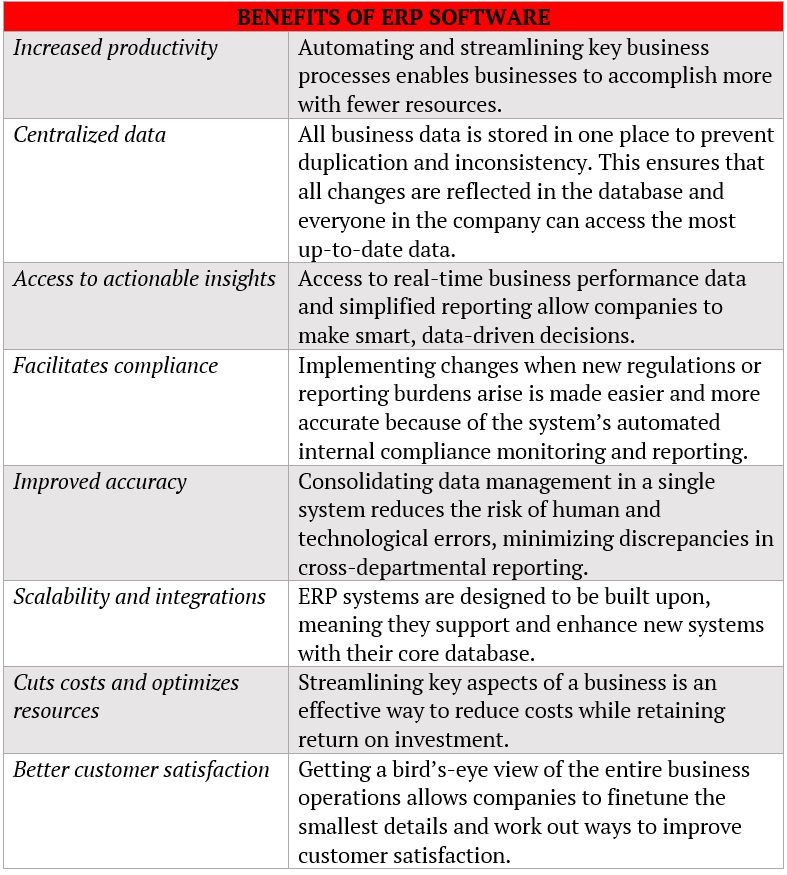ERP platforms help businesses centralize data and streamline processes. Here are our picks for the best ERP software. Find out which one suits your needs

Every business needs an effective system to manage their day-to-day operations. This is where enterprise resource planning (ERP) software comes in handy.
ERP platforms enable businesses to consolidate their data, automate workflows, and streamline core processes. By having such systems in place, companies can also lower their administrative and operational expenses, as well as gather real-time insights to help them make informed business decisions.
In this article, HRD lists the best ERP software we have reviewed so far to help you find the right platform for your business needs. We will discuss each system’s key features and functions, and how these can help you centralize often-complex processes. Read on and find out which of these business planning tools provide the best fit.
10 best ERP software – HRD’s top picks
Each business faces a unique set of challenges. There isn’t a clear-cut top choice among the platforms featured on our list, so the HRD review team decided to arrange the platforms alphabetically.
Here are the 10 best ERP software solutions that made our shortlist.
1. Acumatica
Acumatica is a software-as-a-service (SaaS) ERP platform designed for small and medium-sized businesses. The software boasts features that can help businesses manage their finances and engage clients through adept customer relationship management (CRM) tools. The platform can also monitor a company’s assets with automation and machine learning technologies.
Some of Acumatica’s key functions include:
- compliance management
- distribution management
- e-commerce
- inventory and warehouse management
- payroll management
- project accounting
- purchase order management
- recurring revenue management
- requisition management
- sales order management
- service management
Most of the platform’s features are designed for businesses in the financial services and manufacturing sectors. For companies in other industries that might need a bit more support, Acumatica has a specialist support team and a training guide. These can help train users and customize the platform to suit different business needs.
Acumatica adopts a pay-for-what-you-use model that lets users finetune the modules and pick only the features that they need. The platform also utilizes industry-standard customization tools such as C# and .NET, which are widely used by developers and IT specialists.
You can check out the software’s complete list of features and benefits in our Acumatica Review.
2. Brightpearl
Brightpearl functions primarily as a cloud-based retail management tool designed to streamline the operations of small and medium-sized enterprises. The ERP platform comes with a comprehensive range of features that allows merchants to manage their inventory, customer relationships, accounting processes, and orders.
One of the best ERP software for SMEs, Brightpearl enables real-time inventory visibility to help businesses make informed decisions on purchasing and stock management. It also offers tools for CRM, allowing companies to monitor customer interactions and deliver customized services.
The platform’s financial management features include accounting integration, invoicing, and reporting capabilities. These functionalities enable businesses to maintain accurate financial records and gain insights into their performance.
Brightpearl integrates with various e-commerce platforms, including Shopify, Magento, and BigCommerce, and popular marketplaces such as Amazon and eBay. This gives merchants access to a centralized hub for multichannel retail management.
Learn more about this ERP software’s comprehensive list of features in this Brightpearl Review.
3. ERPNext
ERPNext is another ERP software designed for small- and medium-sized businesses. The cloud-based tool helps SMBs streamline core processes, including accounting, HR management, sales, purchase, inventory, CRM, project and task management, and website development.
The platform is built on Python and MySQL. This enables businesses to use the tool’s open-source modeling structure for customization, eliminating the need for custom programming or expert developer support.
ERPNext touts itself as among the “most agile enterprise resource planning platforms” in the market. Its highly integrative and customizable structure allows companies to combine multiple features of other traditional ERP systems and tailor the platform to suit specific business needs.
The software can integrate with more than a thousand systems and applications. It also automates core business processes without the need to subscribe to an ERP platform that can be difficult to understand and personalize.
Find out why this platform is among our picks for the best ERP software in this ERPNext Review.
4. Microsoft Dynamics 365 Business Central
Microsoft Dynamics 365 Business Central is one of the most popular ERP platforms in the business support and HR tech industry. The software helps businesses streamline core processes by centralizing data and automating workflows.
Another key selling point of Microsoft Dynamics 365 Business Central is that it integrates with other Microsoft cloud services, including Office 365. Customization options with Microsoft Power Apps, Microsoft Power Automate, and Microsoft Power BI are also accessible. These features make the platform among the most flexible and functional ERP tools in the market.
The software is used by more than 160,000 businesses worldwide. Find out why many companies choose this ERP platform in our Microsoft Dynamics 365 Business Central Review.
5. Odoo ERP
Odoo ERP’s extensive range of business management and CRM applications caters to a highly modular and flexible specification-based software. This enables businesses to sort out their processes accurately and configure the ERP software to fit their needs.
The platform uses an open-source development structure, giving companies access to developers and business experts to help address their needs. It also allows enterprises to streamline core processes, including production planning, manufacturing, logistics, finance and accounting, warehouse management, and human resources.
Check out the ERP software’s full list of features and functionalities in our Odoo ERP Review.
6. Oracle NetSuite
Oracle NetSuite is one of the first SaaS and cloud-based ERP solutions launched on the market. The platform is designed to help fast-growing small and medium-sized businesses expand into the international arena.
The platform boasts features that enable companies to streamline their core functions, including:
- accounting and finance
- inventory management
- order management
- purchasing
- project management
- workforce management
Using Oracle NetSuite, businesses can manage inventories, track financials, host e-commerce stores, and maintain CRM systems. It incorporates customizable dashboards that can suit various business needs.
Users can also personalize the platform with different metrics, graphs, charts, reminders, and shortcuts. Despite having comprehensive customization features, Oracle NetSuite has a minimalist and user-friendly interface. Its intuitive drag-and-drop functionality is one of the reasons why businesses prefer to use the platform.
Find out if this tool is the best ERP software for your business in our Oracle NetSuite Review.
7. Sage Intacct
Sage Intacct is a cloud-based ERP software that caters to certified public accountancy firms. It gives businesses access to real-time financial management information using reporting that complies with American Institute of Certified Public Accountants (AICPA) standards.
Using artificial intelligence and automation, Sage Intacct helps minimize accounting errors and gather insights on key financial metrics. This saves accountants significant time and allows them to make sound financial decisions.
Some of the core processes the ERP software assists companies with include:
- accounts payable
- accounts receivable
- cash management
- general ledger
- order management
- purchasing
Sage Intacct is one of the few financial management software and ERP platforms endorsed by the AICPA.
Find out what makes this tool among our picks for the best ERP software in this Sage Intacct Review.
8. SAP ERP
SAP ERP is an integrated business planning platform developed by SAP SE, a leading enterprise software development firm based in Germany. As an ERP software solution, SAP helps companies streamline their core processes, manage resources effectively, and gain real-time insights into their operations.
According to its developers, SAP ERP caters to businesses of all sizes, from small and medium-sized enterprises to multinational companies and conglomerates.
The platform boasts a centralized system that integrates various business functions, including:
- finance
- human resources
- manufacturing
- procurement
- sales
- supply chain management
SAP ERP provides companies with a comprehensive range of tools and modules to support these business processes and enable seamless communication and collaboration across departments.
Learn more about what makes this platform a good choice for your business in our SAP ERP Review.
9. SAP Business One
SAP Business One is SAP’s version specifically designed for small and medium-sized businesses. Just like SAP ERP, the platform also comes with tools to help companies effectively manage key business processes, including finance, sales, CRM, inventory, and production.
The system integrates various departments and functions for seamless organizational communication and collaboration. This allows businesses to optimize processes, reduce costs, and improve efficiency.
SAP Business One can be customized to meet specific industry requirements. The platform integrates with other SAP applications and third-party software, extending its capabilities and providing a unified platform for business operations.
Find out the key differences between this platform and the SAP ERP software in our SAP Business One Review.
10. SYSPRO
SYSPRO is an ERP software solution designed for the manufacturing and distribution industries. It aims to help businesses get a full view of their supply chain, finance, distribution, and operations in a comprehensive platform.
One of our picks for the best ERP software, SYSPRO offers a range of modules that cover essential business functions. These include finance, inventory management, sales, purchasing, production planning, and CRM. The platform integrates these modules into a centralized system, allowing seamless data sharing and real-time visibility across the business.
SYSPRO’s key features include advanced reporting and analytics, workflow automation, supply chain management, and multi-site and international operations support. The ERP software also meets industry-specific requirements, including compliance regulations, quality control, and traceability.
Learn more about the benefits of using this ERP software in our SYSPRO Review.
What is ERP software and how does it work?
Enterprise resource planning (ERP) software is a system of interconnected platforms designed to help businesses streamline and manage core processes. These include finance and accounting, supply chain management, sales, CRM, reporting, marketing, manufacturing, operations, and HR.
ERP software coordinates the flow of data across different departments to improve efficiency. These platforms enable businesses to consolidate their data, automate critical tasks, and gain insights into their performance.
As you may have noticed from our picks for the best ERP software, these tools are not just for large multinational corporations. Small and medium-sized businesses can also benefit from having an effective ERP system in place.
ERP platforms are commonly used by financial services and manufacturing businesses. The popularity of modern ERP systems, however, has extended to a wide range of industries, including retail, healthcare, and non-profit work.
What are the benefits of using ERP software?
Businesses turn to ERP software to streamline often-complex business processes and enable them to make data-driven business decisions. Here are some of the benefits companies get by integrating an effective ERP system into their daily operations:

What should you look for when searching for the best ERP software for your business needs?
When evaluating which ERP software is best for your business, there are key features that you need to consider. These include:
- Automation: This helps your staff complete repetitive tasks faster, especially for departments with cross-functional workflows.
- Integrations: The best ERP software integrates with every tool that your business uses to coordinate workflows, including HR, accounting and finance, CRM, and IT.
- Database access: All connected software systems in the ERP must be able to access real-time data for every user, no matter where they are accessing the data from.
- Analytics and reporting: An ERP platform must deliver actionable insights into internal and external factors that impact business performance.
- Security: All business data should be kept secure. ERP software must enable data encryption, automatic backups, multifactor authentication (MFA), and system monitoring.
If you want to find out more about the different ERP software solutions that best suit your business, you can visit our HR Software Review Page. Here, we provide an in-depth look at the different tools that help HR professionals make informed decisions when choosing the best platforms for their needs.
What do you think about our list of the best ERP software? Are there platforms that you felt should’ve been included? Share your thoughts in the comments section below.








